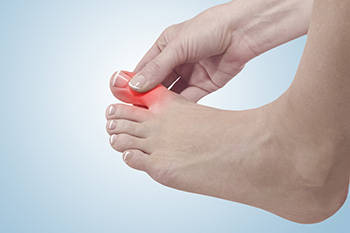
Gout is a form of inflammatory arthritis caused by a buildup of uric acid crystals in the joints, most commonly in the big toe. It often develops suddenly, with intense pain, redness, swelling, and warmth in the affected area. Gout attacks can last from a few days to a couple of weeks, with symptoms often peaking within 24 hours. Triggers include a diet high in purines, especially red meat, seafood, and alcohol. Other causes are dehydration, obesity, and certain medical conditions. The pain can be sharp, throbbing, and severe enough to make even light pressure, like a bedsheet, feel unbearable. A podiatrist can diagnose gout with an exam, joint fluid analysis, or imaging. Treatment may involve anti-inflammatory medication, corticosteroid injections, dietary guidance, and long-term uric acid management. Preventive care is key to reducing the frequency and severity of future flare-ups. If you have developed gout, it is suggested that you schedule an appointment with a podiatrist who can help you to manage this painful condition.
Gout is a painful condition that can be treated. If you are seeking treatment, contact Pedram Aslmand, DPM from Advanced Foot and Ankle Center. Our podiatrist will treat your foot and ankle needs.
What Is Gout?
Gout is a form of arthritis that is characterized by sudden, severe attacks of pain, redness, and tenderness in the joints. The condition usually affects the joint at the base of the big toe. A gout attack can occur at any random time, such as the middle of the night while you are asleep.
Symptoms
- Intense Joint Pain - Usually around the large joint of your big toe, and it most severe within the first four to twelve hours
- Lingering Discomfort - Joint discomfort may last from a few days to a few weeks
- Inflammation and Redness -Affected joints may become swollen, tender, warm and red
- Limited Range of Motion - May experience a decrease in joint mobility
Risk Factors
- Genetics - If family members have gout, you’re more likely to have it
- Medications - Diuretic medications can raise uric acid levels
- Gender/Age - Gout is more common in men until the age of 60. It is believed that estrogen protects women until that point
- Diet - Eating red meat and shellfish increases your risk
- Alcohol - Having more than two alcoholic drinks per day increases your risk
- Obesity - Obese people are at a higher risk for gout
Prior to visiting your podiatrist to receive treatment for gout, there are a few things you should do beforehand. If you have gout you should write down your symptoms--including when they started and how often you experience them, important medical information you may have, and any questions you may have. Writing down these three things will help your podiatrist in assessing your specific situation so that he or she may provide the best route of treatment for you.
If you have any questions, please feel free to contact our offices located in Long Beach, CA . We offer the newest diagnostic and treatment technologies for all your foot care needs.

